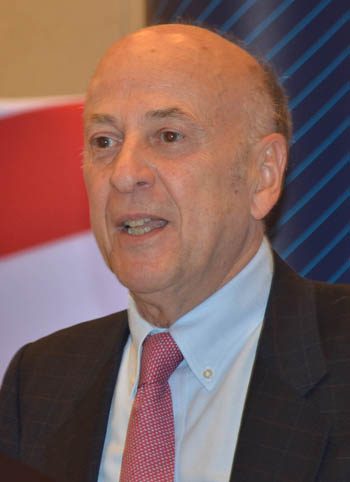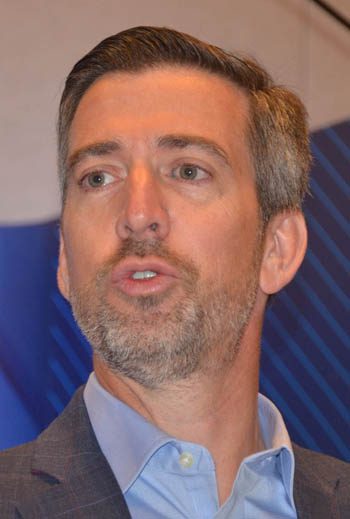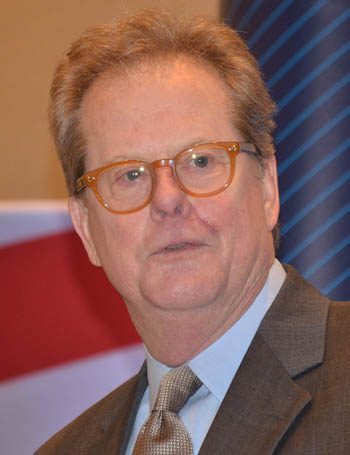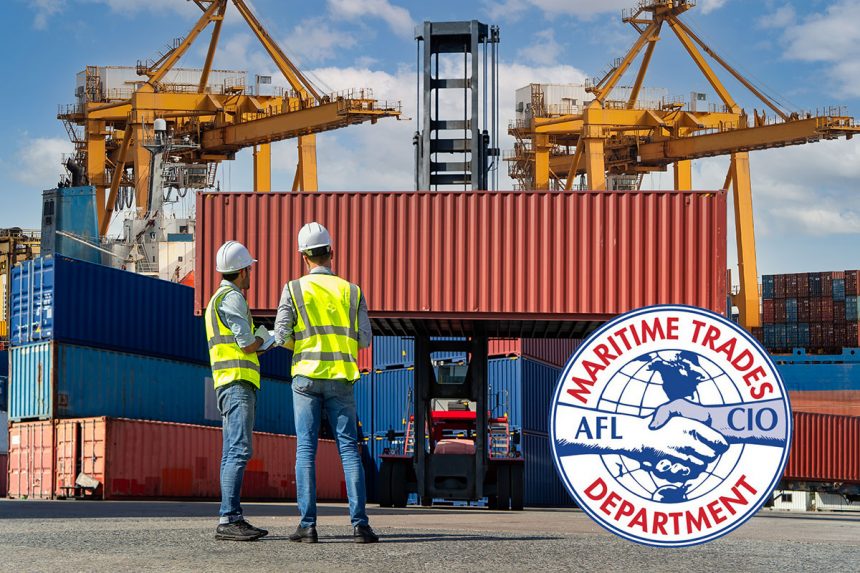The MTD Executive Board heard from officials of three U.S.-flag companies dedicated since Hurricane Maria decimated Puerto Rico to providing relief and rebuilding the island.
Addressing the board during its annual meeting near Orlando were National Shipping of America President Torey Presti; TOTE Maritime Puerto Rico President Tim Nolan; and Crowley Maritime Senior Vice President and General Manager, Puerto Rico Services John Hourihan. Presti and Nolan spoke on March 8, while Hourihan delivered his remarks March 9.
Consistent with the meeting’s theme, all of the speakers talked about how Jones Act carriers have led the way in helping Puerto Rico recover from Maria, which devastated the territory last September.

Presti credited maritime labor for its united support of America’s freight cabotage law, which he noted “promotes and protects the American Merchant Marine, and furthermore the law defines seamen’s rights.”
He said his company worked with the Seafarers Union, the Steelworkers and the AFL-CIO to gather and ship relief cargoes to Puerto Rico, many of which were donated by union members. That operation along with the larger response “was tremendous, and it couldn’t have happened without the Jones Act carriers,” Presti said.
Citing unfair media criticism of the Jones Act’s effects on Puerto Rico, he continued, “The pundits that supposedly know about the Jones Act really were off base. The problem was that once the cargo got to Puerto Rico, we had a heck of a time getting it off…. We couldn’t get [containers] out of the gate (due to damaged infrastructure). The problem wasn’t getting the cargo to Puerto Rico; that was done very efficiently.”
Presti also suggested taking an expanded view of the law, which supports around 500,000 American jobs and which has consistently been described by military leaders and politicians as vital to national, economic and homeland security.
“We need to look at the Jones Act as a utility,” he explained. “The islands depend on it – not only Puerto Rico, but Hawaii, Alaska and Guam as well.”
He said the Jones Act “has encouraged huge investments” benefiting Puerto Rico, including new LNG-powered vessels, port facilities and more, and asserted that ocean transportation costs do not harm the island’s economy.
“Here again, the uninformed pundits don’t understand,” he said. “If you price [cargo] dollar for dollar, best value, Jones Act carriers (win). I think that can stand up to anything.”

Nolan said that in all of his 25 years in the maritime industry, the period after the hurricane made him most proud.
“That time really exemplified what the maritime industry is all about,” he stated. “It wasn’t about TOTE, it wasn’t about other competitors. It was about all of us as one maritime industry. We as the American maritime industry were the first industry to stand up after the hurricane. We were worried about the island and what we could do to get the island back up on its feet.”
He reminded the board and guests that when Maria hit on Sept. 20, it was the tenth-most powerful hurricane ever to hit in the Atlantic. And, it struck just a week after Hurricane Irma already had left 80,000 Puerto Rico residents without power.
Nolan then described a crushing but motivating moment that happened shortly after he arrived in Puerto Rico, soon after Maria. A doctor told him that her hospital had lost all the babies in the neonatal intensive care unit.
“That’s when it really hit home to me, what the impact of this hurricane meant to Puerto Rico,” Nolan stated. “We can say they were without power. We can say they were without water and cell coverage. But when it came down to those babies, it truly put it into perspective what this hurricane meant to the island.”
He credited SIU Port Agent Amancio Crespo for working exhaustively with the company to help as many people as possible and added, “We worked hand in hand on a daily basis. It took a collective effort by all of us to get through this, and to stand back up the industry at one time.”
Companies stayed in touch and worked together without regard for competition, Nolan pointed out.
“This comes back again to, it wasn’t one organization. It was one collective American maritime industry that stood up first and got the island back on its feet first,” he said, adding that when the first terminal opened three days after the hurricane, TOTE had 11 Jones Act vessels ready to dock, carrying thousands of containers.
He commended the steward departments from the Isla Bella and the Perla del Caribe. When in port, they fed an additional 50 shore-side staff along with the crew. The ships also were used for lodging.
Nolan mentioned that TOTE has helped feed more than 20,000 families through working with charitable organizations, and also has sent 19 containers as part of Operation Agua, with 11 more scheduled. (Operation Agua provides water filters free-of-charge to residents, schools and organizations throughout the island. The American Federation of Teachers originated the program with others unions – like the MTD-affiliated SIU and AFSCME – as sponsors.)
“This was essential and again, who was it that stood up? The American maritime industry. We’re proud to be able to support this great cause,” he said. (For more information about Operation Agua, visit aft.org or operationagua.com.)
Turning to the attacks against the Jones Act, he said, “During a challenge, you have opportunists out there who try to take advantage of it, and the hurricane was no different. Folks came out and tried poking at the Jones Act. There was a 10-day waiver that was issued … more politically driven than anything else. There were 14 (foreign) ships that requested to call. One had relief cargo. If you step back and reflect, this validates the importance of the American maritime industry. In this 10-day window, folks outside the American maritime industry did not step up. We were the ones that delivered close to 100,000 containers. We’re the ones that flowed the goods down to the island…. It’s not that we’re here just today. We’re here for the long term.”

Hourihan noted that Crowley is headquartered in Jacksonville, Florida. The state itself has 52,000 jobs directly related to the Jones Act, he said, adding that more than half of the cargo that goes through Jacksonville is bound for Puerto Rico. The territory gets 85 percent of its cargo from there.
In his 30-plus years in the industry, “one thing I’ve come to believe is that defending the Jones Act will never stop,” Hourihan said. “There will always be those that are against it, and so it’s just part of our everyday work. It’s not a mountain we’re going to climb and be done.”
Focusing on Puerto Rico, he noted tax changes that began in 2006 and which phased out incentives for production on the island. This led to a recession which became a depression. Even though it had nothing to do with maritime laws, “that adds ammunition where there are challenges on the island,” he said. “It can be easy to point fingers as to, somebody’s got to be responsible for this. And oftentimes it’s the Jones Act carriers that (unfairly) get that hit.”
He used an example of the cost of a can of soup in Puerto Rico. Only two percent of the cost is attributable to transportation.
Ongoing education is critical, Hourihan said, both with the general public and with politicians and military leaders.
He then described the company’s response to Maria, from pre-storm preparations to having ships arrive less than two hours after the first port reopened.
Crowley’s Puerto Rico-based employees worked hard despite storm-related challenges at home, he said. Additionally, mainland-based employees put together more than 1,000 care packages for their counterparts in the territory.
He reiterated the fact that Jones Act carriers brought more than enough relief supplies to the ports, but cargo stacked up because of problems with roads and other infrastructure.
Before that was understood, however, the waiver was issued. “It really didn’t accomplish much of anything,” Hourihan said. “Crowley as a company, and I believe I speak on behalf of the American Maritime Partnership also – we are not opposed to waivers if there’s a need that can’t be met by a Jones Act company.”
He pointed out that between Crowley and TOTE, they have invested more than $1 billion in Puerto Rico.
Moreover, he said the Deepwater Horizon disaster in 2010 (another time when the Jones Act was unfairly blamed for hindering cleanup efforts) created “a wakeup call and a refresh.” Puerto Rico is “yet another wakeup call” to promote the facts about the Jones Act.
“The events in Puerto Rico pointed out that we can be going along fine, and we can have support,” he concluded. “But when you have events like what happened with Maria, all bets can be off. We’ve got to be able to close that gap.”

